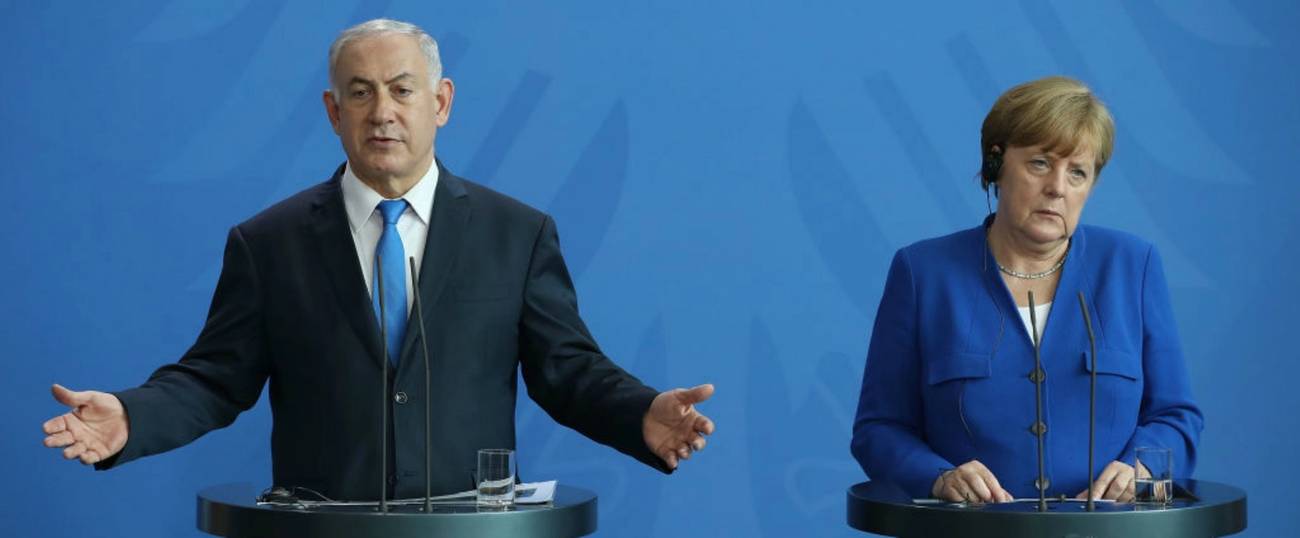Iran Looms Over Merkel’s Israel Visit
Germany’s ‘unique relationship’ with Israel is colliding with its new closeness to Iran




A week after Benjamin Netanyahu told an audience at the U.N. that “Europe and others are appeasing Iran,” German Chancellor Angela Merkel, the unofficial leader of Europe and head of its most powerful state, will arrive in Jerusalem tonight on a scheduled visit. Iran is virtually certain to dominate the agenda but planned discussions of Israel’s settlement policy and “The Conflict” may provide some diversion from the most contentious matters.
Germany is in a unique position in its relations with Israel and Iran. While other countries may calculate their foreign policies and international obligations without any special regard for Israel or the ideology animating the Iranian regime, Germany’s government has continually pledged to combat anti-Semitism and defend Israel’s security. “This historical responsibility is part of my country’s raison d’être,” Merkel has said in the past. But what Germany swears to oppose are precisely the goals that Iran’s government has repeatedly, publicly avowed. Picking only one particularly illustrative example, Benjamin Weinthal, writing for Tablet, describes how:
In 2008, Mohammad Javad Larijani, the secretary of the Iranian judiciary’s High Council for Human Rights, denied the Holocaust and called for the obliteration of Israel during a German foreign ministry-sponsored event held close to Berlin’s Holocaust Memorial.
The same year that Larijani made his statements, Merkel addressed an audience in Israel’s Knesset: “I want to explicitly stress that every German government and every German chancellor before me has shouldered Germany’s special historical responsibility for Israel’s security … therefore, Israel’s security will never be open to negotiation.” Earlier this week she reaffirmed that “a unique relationship connects Germany and Israel.”
Along with most other European countries, Germany supported the 2015 Obama administration-led “Iran deal” that Israel strongly opposed and the U.S. withdrew from earlier this year. Explaining his decision to exit the deal in May, President Trump called it “a horrible one-sided deal that should have never, ever been made” and said, “it didn’t bring calm, it didn’t bring peace, and it never will.”
After getting out of the agreement the Trump administration reimposed sanctions on Iran. The new sanctions, set to take effect in early November, are supposed to limit Iran’s ability to fund ongoing wars and support political-terrorist groups like Hezbollah, while also forcing Tehran to accept more stringent conditions in a possible future deal. Meanwhile, the European Union is working to circumvent those sanctions and bolster the original 2015 deal. To that end, the EU has devised an instrument called the Special Purpose Vehicle (SPV) to sustain lucrative trade and financial relations with Iran. It’s Germany’s backing of the SPV and general support for normalizing relations with Iran that has provoked ire in Israel and, among other things, prompted Netanyahu’s statement about European appeasement.
The scale of Germany’s economic investment in Iran was detailed last week in Weinthal’s article for Tablet that puts the value of German exports to Iran at $3.42 billion in 2017. “The German government not only rejects U.S. sanctions,” Weinthal writes, “but also provides state credit guarantees to German companies that do business in the Islamic Republic, as means of facilitating German trade with Iran.”
Opposing the position taken by Germany’s government, the country’s largest newspaper, Bild, published an article this week by its foreign policy editor, Julian Röpcke, calling on German businesses to halt all trade with Iran.
“Iran cannot at this time be an ally, neither in the fight against terrorism, nor as an oil supplier or trade partner,” Röpcke wrote. Iranian attacks, including those carried out under the pretext of its war against the Islamic State, Röpcke argues, have actually been directed “against those who stand in the way of the corrupt regime in Tehran; against those who do not want to stand inactively by when Iran’s leader again and again propagates the ‘extermination’ of Israel.”
Outside the economic sphere, Merkel has also allowed the Iranian-backed Hezbollah, with an estimated 950 members inside Germany, to continue operations in the country that include fundraising and recruitment efforts. Meanwhile, earlier this week French officials announced that Iran was behind a June terrorist plot targeting a rally held by an Iranian opposition group outside Paris. Prior to the announcement, an Iranian diplomat tied to the plot was arrested inside Germany.
It’s an awkward position for Merkel: Germany’s sworn commitments to Israel pulling against its apparent interests in Iran, tension building until it snaps back or something gives.
Jacob Siegel is Senior Editor of News and The Scroll, Tablet’s daily afternoon news digest, which you can subscribe to here.